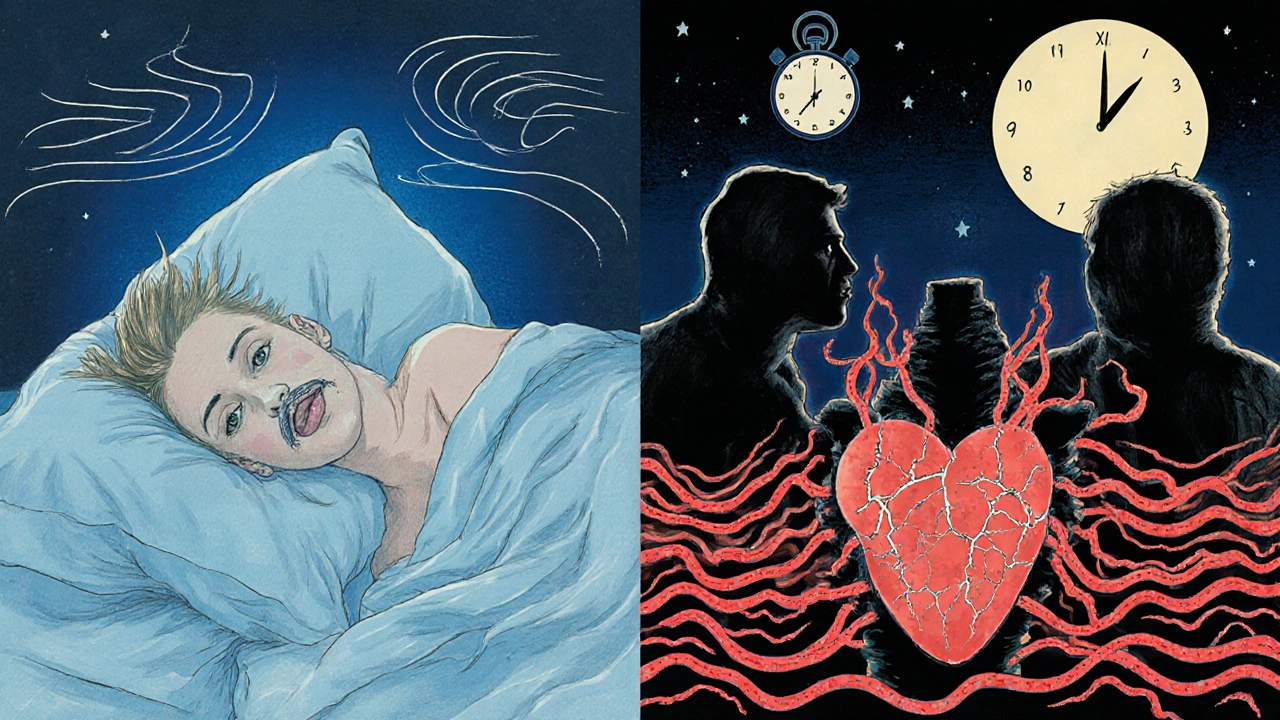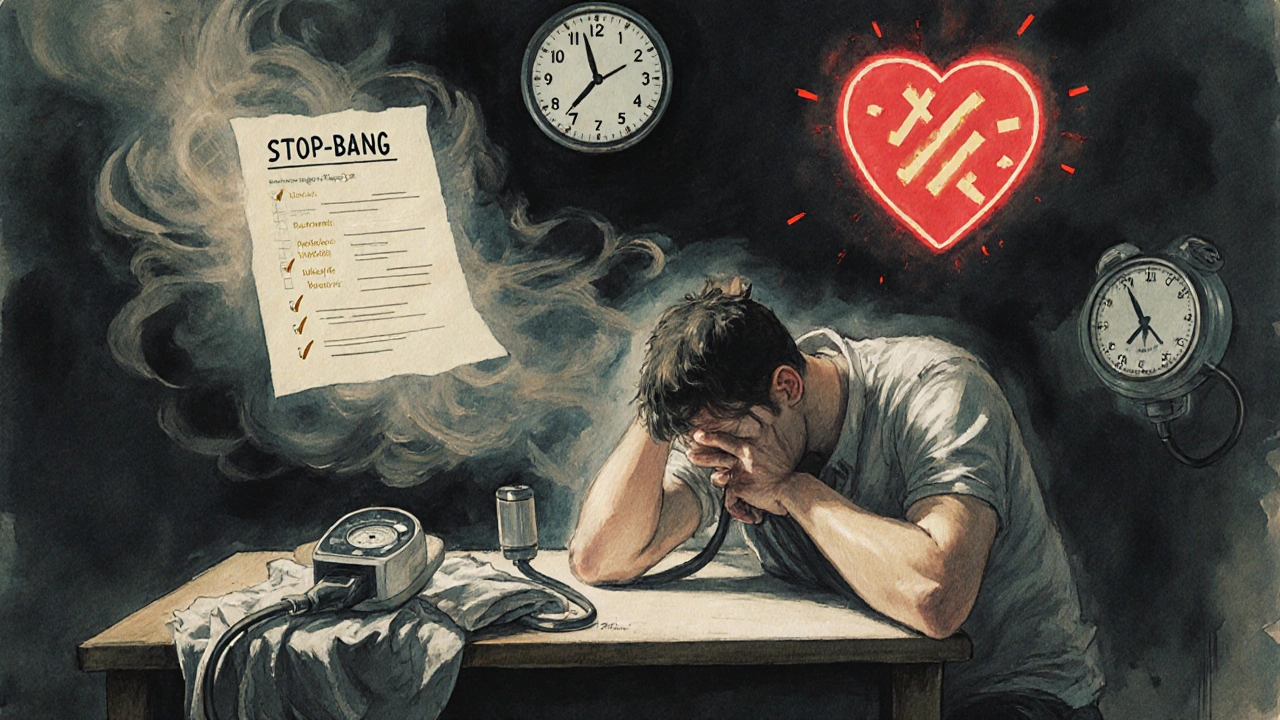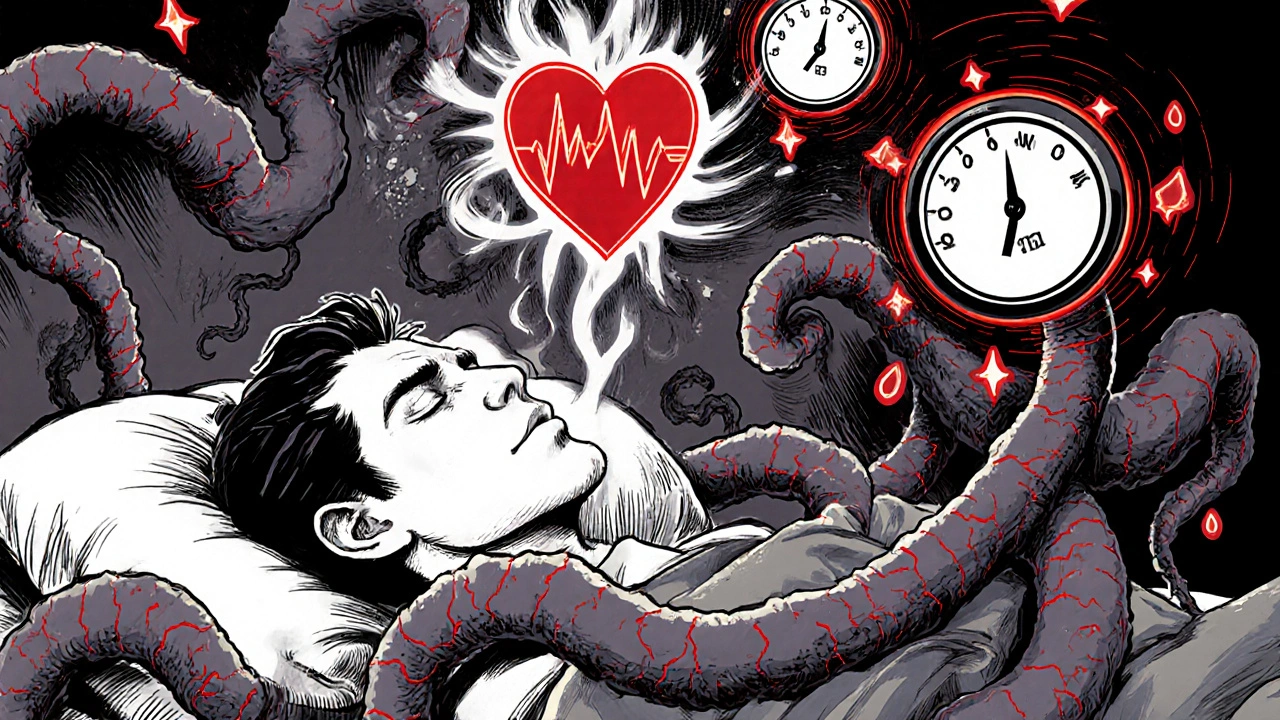Every night, while you’re asleep, your body might be fighting for air. If you snore loudly, wake up gasping, or feel exhausted even after 8 hours in bed, you could have obstructive sleep apnea - and your heart may already be paying the price.
What Is Sleep Apnea, Really?
Sleep apnea isn’t just loud snoring. It’s when your airway collapses repeatedly during sleep, stopping your breathing for 10 seconds or longer - sometimes hundreds of times a night. The most common type, obstructive sleep apnea (OSA), happens when throat muscles relax too much, blocking airflow. Central sleep apnea, less common, is when your brain fails to send the right signal to breathe.
Over 1 billion people worldwide have sleep apnea. In the U.S., about 40 million are affected. And here’s the scary part: 80% of moderate to severe cases go undiagnosed. Many people think they’re just tired or old. But this isn’t normal fatigue. It’s your body struggling under stress - and your heart is caught in the middle.
How Sleep Apnea Attacks Your Blood Pressure
When your airway shuts off, oxygen levels drop. Your brain panics. It floods your body with stress hormones - adrenaline and noradrenaline - up to four times higher than normal during sleep. Your heart rate spikes. Blood vessels constrict. Your blood pressure surges.
This isn’t a one-time spike. It happens every time you stop breathing. Over months and years, your body learns to keep blood pressure elevated - even when you’re awake. That’s why up to 80% of people with resistant hypertension (high blood pressure that won’t respond to three or more medications) have undiagnosed sleep apnea.
And it’s not just the numbers. Normal sleep should bring your blood pressure down by 10-20%. But in people with sleep apnea, 70-80% don’t experience this dip. Some even see their blood pressure rise at night - a pattern called “reverse dipping.” This is a major red flag. It means your heart is working overtime around the clock, increasing your risk of stroke, heart attack, and kidney damage.
The Direct Link to Heart Disease
Having sleep apnea doesn’t just raise your blood pressure - it directly damages your heart.
People with moderate to severe OSA are 30% more likely to develop coronary artery disease. They’re 140% more likely to get heart failure. And their risk of a fatal heart attack jumps by 60% compared to those without sleep apnea.
Why? Three key mechanisms are at work:
- Chronic low oxygen triggers inflammation. C-reactive protein levels - a marker of body-wide inflammation - rise by 35-50% in OSA patients.
- Endothelial damage occurs when blood vessel linings become stiff and dysfunctional. Flow-mediated dilation (a measure of artery health) drops by 25-40%.
- Oxidative stress builds up. Malondialdehyde, a marker of cell damage, is 2-3 times higher than in healthy individuals.
These changes don’t happen overnight. But over time, they wear down your arteries, promote plaque buildup, and make your heart muscle work harder. The result? A heart that’s more likely to fail, fibrillate, or suddenly stop.

Heart Rhythm Problems and Stroke Risk
Sleep apnea doesn’t just cause heart disease - it causes dangerous heart rhythms.
People with OSA are 2 to 4 times more likely to develop atrial fibrillation (AFib), the most common irregular heartbeat. In fact, nearly half of all AFib patients have untreated sleep apnea - compared to just 21% of people without AFib.
And here’s what cardiologists are seeing: if you have AFib and sleep apnea, your ablation procedure is 30% less likely to work. Medications don’t help as much. Your heart keeps beating erratically - because the root cause hasn’t been addressed.
Stroke risk is even more alarming. Sleep apnea increases your chance of a first stroke by 2.5 times. If you’ve already had a stroke, your risk of another one jumps to 3.2 times higher. And if your oxygen levels drop below 90% for more than 12% of your sleep, your risk of dying from a stroke rises by 4.3 times.
It’s not random. About 26.5% of heart attacks in people with sleep apnea happen between midnight and 6 a.m. - when breathing pauses are most frequent. That’s not coincidence. That’s cause and effect.
Why Younger People Are at Higher Risk
You might think sleep apnea only affects older, overweight men. But recent data from a 2024 study of nearly 10,000 adults shows a shocking trend.
Adults aged 20-40 with sleep apnea symptoms have a 45% higher chance of high blood pressure, 33% higher chance of diabetes, and 25% higher chance of metabolic syndrome than their peers without sleep apnea.
In people over 41, the increase is much smaller - just 10-12%. That means sleep apnea isn’t just a side effect of aging. It’s accelerating heart disease in younger people. If you’re in your 20s or 30s, snoring and daytime fatigue aren’t “just part of life.” They could be early warning signs of a ticking time bomb in your cardiovascular system.

Why CPAP Isn’t Always the Full Answer
Continuous Positive Airway Pressure (CPAP) machines are the gold standard treatment. They keep your airway open with gentle air pressure. Sounds simple - and it is. But here’s the problem: only 46% of people use CPAP consistently (at least 4 hours a night, 70% of nights).
And even when used perfectly, CPAP only lowers blood pressure by 2-3 mmHg on average. That’s not nothing - but it’s not enough to fully undo the damage.
However, CPAP does other things that matter just as much: it reduces stroke recurrence by 37%, improves heart failure outcomes, and increases the success rate of heart procedures like ablation. It doesn’t just treat sleep apnea - it protects your heart.
The issue isn’t the machine. It’s adherence. People stop using CPAP because it’s noisy, uncomfortable, or they feel fine after a few nights. But the damage keeps happening while you sleep - even if you don’t feel it.
What Should You Do?
If you have any of these, get checked:
- Snoring loud enough to wake your partner
- Waking up gasping or choking
- Daytime fatigue even after 8 hours of sleep
- High blood pressure that won’t go down with medication
- Been diagnosed with atrial fibrillation, heart failure, or stroke
Doctors now recommend screening for sleep apnea in all patients with these conditions - especially if treatments aren’t working. The STOP-Bang questionnaire (a simple 8-question test) is 84% accurate at spotting moderate to severe cases. It takes less than a minute.
Home sleep tests are 85-90% accurate for moderate to severe cases. If you’re at risk, a simple overnight test at home can change your life.
The Bottom Line
Sleep apnea isn’t just a sleep problem. It’s a cardiovascular emergency in slow motion. It raises blood pressure, damages arteries, triggers heart attacks, and increases stroke risk - often without you even knowing it.
The good news? Identifying and treating it can cut your heart disease risk significantly. You don’t need to be overweight. You don’t need to be old. If you’re tired, snore, or have high blood pressure - your heart is sending you a signal. Listen before it’s too late.


King Over
November 20, 2025 AT 03:06Johannah Lavin
November 21, 2025 AT 15:43Ravinder Singh
November 22, 2025 AT 04:24Russ Bergeman
November 23, 2025 AT 14:50Dana Oralkhan
November 25, 2025 AT 03:38Jeremy Samuel
November 27, 2025 AT 00:23Destiny Annamaria
November 27, 2025 AT 15:38Ron and Gill Day
November 27, 2025 AT 20:41Summer Joy
November 29, 2025 AT 02:28Ravi boy
November 30, 2025 AT 19:14Matthew Karrs
November 30, 2025 AT 22:32Matthew Peters
December 1, 2025 AT 08:48Liam Strachan
December 2, 2025 AT 20:46Michael Fessler
December 4, 2025 AT 15:26Katie Magnus
December 5, 2025 AT 20:21